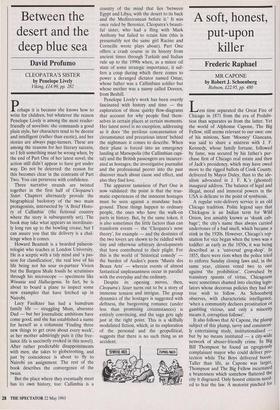Between the desert and the deep blue sea
David Profumo
CLEOPATRA'S SISTER by Penelope Lively Viking, £14.99, pp. 282 Perhaps it is because she knows how to write for children, but whatever the reason Penelope Lively is among the most reader- friendly of novelists: she commands a good plain style, her characters tend to be decent and intelligent (rather than exotic), and her stories are always page-turners. These are among the reasons for her literary success, so I felt something must be wrong when, by the end of Part One of her latest novel, the action still didn't appear to have got under way. Do not be deterred: the reason for this becomes clear in the contrasts of Part Two. You can persevere with confidence.
Three narrative strands are twisted together in the first half of Cleopatra's Sister. Chapters alternately provide the biographical backstory of the two main protagonists, intersected by 'A Brief Histo- ry of Callimbia' (the fictional country where the story is subsequently set). The book may take what appears an inordinate- ly long run up to the bowling crease, but I can assure you that the delivery is a chal- lenge when it comes.
Howard Beamish is a bearded palaeon- tologist who teaches at London University. He is a sceptic with a tidy mind and 'a pas- sion for classification', the real love of his life being not his sour ex-partner Vivien but the Burgess Shale fossils he scrutinises through his microscope — specimens like Wiwaxia and Hallucigenia. In fact, he is about to board a plane to inspect some new examples that have fetched up in Nairobi.
Lucy Faulkner has had a humdrum family life — struggling Mum, absentee Dad — but her journalistic ambitions have come good, and she has established a name for herself as a columnist 'Finding three new things to get cross about every week', as her mother admiringly puts it (the free- lance life is succinctly evoked in this novel). After rather predictable disappointments with men, she takes to globetrotting, and just by coincidence is about to fly to Nairobi on assignment. The rest of the book describes the convergence of the twain.
But the place where they eventually meet has its own history, too: Callimbia is a country of the mind that lies 'between Egypt and Libya, with the desert to its back and the Mediterranean before it.' It was once ruled by Berenice, Cleopatra's beauti- ful sister, who had a fling with Mark Anthony but failed to retain him (this is presumably not the same girl Racine and Corneille wrote plays about). Part One offers a crash course in its history from ancient times through Turkish and Italian rule up to the 1990s when, as a minor oil state of some strategic importance, it suf- fers a coup during which there comes to power a deranged dictator named Omar, whose father was a Callimbian soldier but whose mother was a nanny called Doreen, from Bexhill.
Penelope Lively's work has been overtly fascinated with history and time — the exploration of those quirky flow-diagrams that account for why people find them- selves in certain places at certain moments. Her latest novel is no exception, addressing as it does 'the perilous concatenation of circumstance and precarious intent' behind the nightmare it comes to describe. When their plane is forced into an emergency landing at Marsopolis (the Callimbian capi- tal) and the British passengers are incarcer- ated as hostages, the investigative journalist and the professional peerer into the past discover much about cause and effect, and also they find love.
The apparent tameness of Part One is now validated: the point is that the trau- matic experiences of the innocent hostages must be seen against a mundane back- ground. These things happen to ordinary people, the ones who have the walk-on parts in history. But, by the same token, it is also sometimes the little factors than can transform events — the 'Cleopatra's nose theory', for example — and the destinies of the two lovers are shown to be riddled with tiny and otherwise arbitrary developments that have contributed to their plight. For this is the world of 'historical comedy' the burden of Auden's poem `Musee des Beaux Arts' — wherein events of almost fantastical unpleasantness occur in parallel with the everyday and the ordinary.
Despite its opening moves, then, Cleopatra's Sister turns out to be a story of immense tension and intrigue. The group dynamics of the hostages is suggested with deftness, the burgeoning romance (under less than promising circumstances) is entirely convincing, and the saga gets ugly just at the right point. This is a skilfully modulated fiction, which, in its exploration of the personal and the geopolitical, suggests that there is no such thing as an accident.


















































 Previous page
Previous page